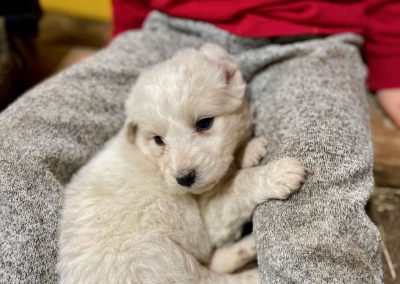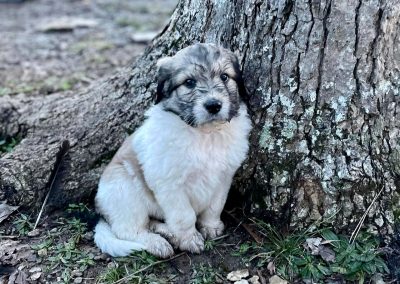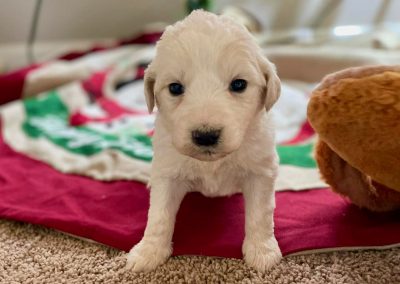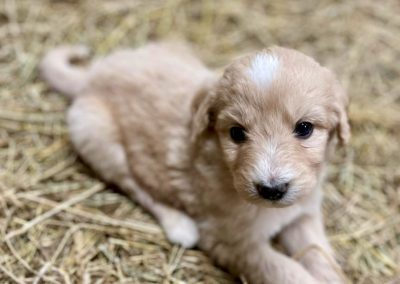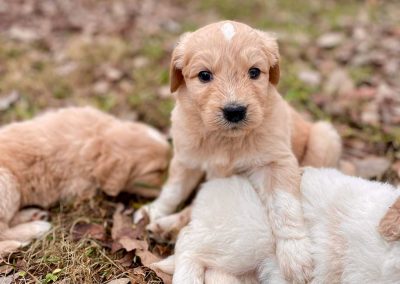Fame Flower Farm Pyredoodles
Here at Fameflower Farm, we have a small, personalized breeding program. Our dogs and goats are loved on daily with extra special attention given to our pregnant mamas.
Since we only have one litter of puppies at a time, we can spend time with each puppy and give them the best start at life. While mama Bishop is pregnant, we supplement her feed with free range chicken eggs and pet her extra every day. Studies have shown that relaxed and pampered mama dogs give birth to calmer, happier puppies.
After birth, the puppies stay with mama to be fed, comforted, and cleaned. We handle the puppies daily to get them used to human interactions right from the start. On day three, we start early neurological stimulation (ENS). ENS consists of four short movements for each puppy that stimulate the nervous system daily. ENS is completed through day 16 and more information about it can be found here.
We watch our puppies closely and when they first startle at a noise, we begin habituation exercises. They normally start hearing around two weeks and we want them to hear a new noise daily after that. Noises we ensure they hear include, but are not limited to: vacuum, hairdryer, dropped pans, kids screaming, and cows mooing.
As the puppies grow, we introduce them to new experiences and people. Dogs do not generalize so they need to meet people of all ages, shapes, sizes, colors, and clothing choices. Our puppies are socialized with kids daily since we have kids so they will be very ready for human siblings!
To begin the weaning process, we give the puppies goat milk from our grass fed, holistically raised goats. Their first foods include raw goat meat cuts before they are transitioned to puppy food. Their puppy food is soaked in homemade bone broth to soften it while they are still little.
Some Pyredoodles do have separation anxiety, so we make sure each puppy gets individual time away from their siblings daily. While this does not guarantee the dog will not develop separation anxiety, it should help reduce the chances.
Our puppies are also introduced to a crate. They are allowed to explore the crate at their leisure and learn that it is a safe place to relax or nap. Once the pups show an interest in treats, clicker training begins. All pups learn basic clicker training and are taught to sit, rather than jump up, when they want attention.
Although the puppies mainly live in our detached garage turned puppy palace, we give them inside time daily. We know our puppies will eventually be family dogs, so they need to feel comfortable inside and out. They learn at a young age to poop outside their sleeping and indoor area. It takes a bit longer with pee, but they will have the basic idea of where to go potty when they go home.

Pyredoodle FAQs
“Doodles” have grown in popularity for their coat, temperament, and versatility. A doodle is less likely to shed than its purebred, non-poodle parent. Based on the history of the Poodle, most doodles do well with kids, are gentle, and tolerant.
A Pyredoodle is a purposefully bred cross between a Great Pyrenees and a Standard Poodle. Fame Flower Farm Pyredoodles are F1 – meaning first generation bred puppies that are 50% Great Pyrenees and 50% Standard Poodle.
The Great Pyrenees is a large dog known for their love for family, guardian instincts, and thick white coats that shed a lot. They are often utilized as livestock guardian dogs, like our mama dog, Bishop. They normally seem very calm but can jump to action if a threat is detected.
The Standard Poodle is a very intelligent, athletic dog known for its versatility and desire to please. They are affectionate with family, good with children, and very playful. They do not shed and are less likely to drool than other breeds.
A Pyredoodle inherits many of these wonderful traits from both breeds. They are known for being the protectors of the house. Normally calm and gentle, they will notify their families of any perceived threat. If you’re looking for a gentle giant with a big heart that will guard your home and your family, the Pyredoodle may be the right dog for you!
What do “generations” mean?
The generation in dogs reflects if the puppies are purebred or hybrid. P1 is the parent generation or purebred such as a Great Pyrenees, Standard Poodle, etc. When two P1 generations are bred, the resulting puppies are considered F1.
Normally, the F1 dog is bred back to a Poodle, but technically, any back cross is an F1b cross. The advantage of an F1b cross comes from the additional Poodle DNA. The F1 is half Poodle and half Great Pyrenees. When a dog from that type of cross is then bred to a Poodle, the amount of Poodle DNA inherited from parents is increased, and the non-shedding trait enhanced. In theory, an F1b should be less likely to shed and more hypoallergenic than either an F1 or an F2.
- F1 = Great Pyrenees+ Poodle
- F1B = F1 Pyredoodle + Poodle
- F1BB = F1B Pyredoodle + Poodle
- F2 = F1 Pyredoodle + F1 Pyredoodle
- F2B = F1 Pyredoodle + F1B Pyredoodle
- F2BB – F2B Pyredoodle + Poodle
- F3 = F2 Pyredoodle + F2 Pyredoodle OR
- F3 = F1B Pyredoodle + F1B Pyredoodle
Multi-Generational = Generations past F3
Will an F1 Pyredoodle shed?
With a first-generation doodle, the chances of shedding are higher than with later generations. It is difficult to tell how much a puppy will shed until they are closer to a year old. The poodle coat gene is dominant, so there is a good chance an F1 Pyredoodle will shed significantly less than its Great Pyrenees mother.
What type of grooming do Pyredoodles need?
A Pyredoodle will likely be a low-shedding dog. They have a short or long coat, depending on the dominant gene they inherited. The short-medium coats are wavy, just like the Standard Poodle, while the ones with longer and thicker coats take after the Great Pyrenees.
Pyredoodles will need regular grooming to prevent matting. A comb can help get tangles out of wavy fur and a brush works well on more curly coats. Dogs can be taken to the groomer for fur cuts or groomed at home. We have always groomed our doodles at home as it is less expensive (we are happy to recommend dog clippers that we like) and the dog has never complained when the fur cut didn’t look perfect.
As with all dogs, it is a good idea to brush their teeth a few times a week and keep their nails trimmed. Bathing should be done only when required as it can interfere with the natural production of skin oils if done too often.
Got a Question?
About animal availability, prices, or workshops? Give us a call at (419) 215-3121 or submit the contact form below. We'll be glad to help you!


